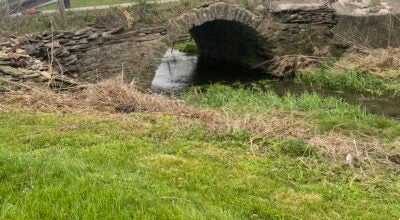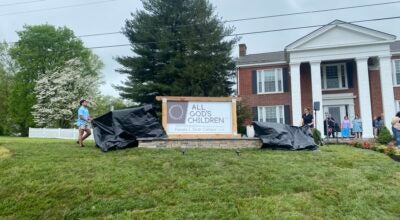Camp Nelson to hold 3rd Annual Luminaria and Memorial Walk
Published 9:30 am Wednesday, November 8, 2023

- Camp Nelson National Monument will host its 3rd Annual Luminaria and Memorial Walk on Saturday. (Camp Nelson National Monument Facebook photo)
|
Getting your Trinity Audio player ready...
|
Camp Nelson National Monument will hold its 3rd Annual Luminaria and Memorial Walk this coming Saturday to honor 400 Black refugees expelled from the camp into a frigid winter storm on Nov. 23, 1864.
The memorial will take place from 6 p.m. to 7 p.m. and will begin at the camp’s visitor’s center.
Camp Nelson officials ask attendees to come 15-20 minutes early to enjoy warm beverages provided by the Camp Nelson Foundation.
The special event will feature interpretive talks by National Park Service Staff and special guests and a guided walk to Graveyard No. 1, where over 100 luminaries will be lit to honor the people expelled and other freedom seekers who sought refuge at Camp Nelson.
What Happened in 1864?
According to the Camp Nelson National Park Service Website, the U.S. Army began enlisting African American soldiers for military service in Kentucky in June and July of 1864. Over 10,000 enslaved Black men self-emancipated by joining the United States Colored Troops (USCT) at Camp Nelson, which was the largest recruitment center for African-American soldiers in the country during the Civil War.
The future soldiers escaped with their families, including women, children, and men unfit for military service.
According to Steve Phan, the Camp Nelson National Monument chief of interpretation, education, and visitor services, recruitment posters for Black soldiers promised aid to recruits’ families. Many men enlisted with this promise in mind as a bastion for hope. There could be freedom for these men and their families if they put their lives on the line to serve.
This promise would soon be broken.
Unfortunately, no policies were protecting Black refugees from slavery at the time, especially in Kentucky, a border state where slavery was still protected.
Brigadier General Speed S. Fry was a Kentuckian and a Mexican War veteran who issued multiple expulsion orders throughout 1864 that directed U.S. Army soldiers to forcibly remove Black refugees, including family members of the USCT soldiers. As a result of these expulsions, an unknown number were re-enslaved, imprisoned, and died of illness or exposure.
It’s important to note that Camp Nelson did not expel its white refugees, who had come to the camp from east Tennessee and east Kentucky after being displaced by the war.
One of the most disturbing and tragic events of the entire war, Phan said, is that of the Nov. 23, 1864, expulsion of 400 refugees from Camp Nelson, leading to the deaths of 102 people. It was the eighth and largest expulsion of Black refugees from the base. Soldiers even burned buildings and housing materials to ensure the refugees would never come back.
“I told him that my wife and children had nowhere to go, and I told him that I was a Soldier of the United States. He told me it did not make a difference; he had orders to take all out of camp,” wrote Private Joseph Miller, Co. I, 124th United States Colored Infantry, in an affidavit detailing the expulsion of his family from Camp Nelson, Nov. 26, 1864
According to Phan, Miller escaped from slavery in October 1864 with his wife and four young children. Upon enlisting, Miller was permitted by the recruiting officer to have his family stay with him at the camp. The family was able to stay in a tent in Camp Nelson for several weeks, but on Nov. 25, 1864, an armed guard ordered Miller’s wife and children to leave the camp.
Miller attempted to obtain a reprieve for his family, knowing the risks they faced, such as white mobs, the lack of food and shelter, and the exposure to harsh weather.
“I was certain that it would kill my sick child to take him out in the cold,” Miller wrote. He was not successful, and the guard taking his family threatened to “shoot the last one of them” if they did not leave the camp alongside the other refugees being removed.
When Miller searched for his family that night, he found them in a meeting house in Nicholasville, six miles from the camp.
According to Miller, “The building was very cold having only one fire…I found my wife and children shivering with cold and famished with hunger…My boy was dead.”
On Nov. 26, Miller gave his account to sympathetic officers at Camp Nelson, and his affidavit would soon circulate far from the army base to high-ranking military officials, newspapers across the country, and political leaders.
This tragedy is nationally relevant because it set in motion a drastic change in national policy toward refugees, Phan said.
General Fry quickly rescinded his expulsion orders after receiving orders from superiors, but this expulsion was still the deadliest.
Within days of the expulsion, the U.S. Army began to institute a policy of receiving and caring for African-American refugees from slavery at Camp Nelson.
On Mar. 3, 1865, Congress passed legislation that officially emancipated the wives and children of U.S. Colored Troops. Refugees were also now protected and had to be accepted into any military base they could make it to.
“Cause they realized the impact, right, they’re like: We need manpower, we need African American men to serve, and then we’re not taking care of their families that are trying to escape enslavement, so they were afraid that would reduce the number of men who would enlist so that impacts a lot of people, especially in Kentucky because slavery is still protected here. The thirteenth amendment had not yet been ratified.” Phan said.
More on the memorial
Camp Nelson will be honoring those refugees who were expelled and who died because of it, but also “the people who didn’t make it and tried to.” Phan said, referring to the countless people expelled before Nov. 23, 1864. “There are many stories of freedom seekers getting assaulted, re-enslaved, killed on the way to military bases.”
Phan said that for a lot of people, this is deeply personal. He’s the child of war refugees from the Vietnam War, so honoring these Black refugees who were left for dead is personal for him, too.
Because of how personal it is, one of the special guests will be the staff at the Kentucky Refugee Ministries, Inc.
“We see what’s going on in the Middle East right now, in Ukraine, and different parts of the world. Obviously, refugees have occurred across human history, so we’re going to have staff from KRM to talk about their organization and the plight of modern-day refugees, and we’re going to have one of their clients there as well, “ Phan said. “It’s critically important to understand that the Civil War and the impacts of the Civil War are still relevant today. With policy and race and social issues and obviously with refugees, refugees will not stop. Refugees will occur as long as human beings are around.”
Another special guest will be Reverend Robert P. Gates Sr., pastor of the historic First Baptist Church of Camp Nelson and a descendant of Sgt. Jesse Commasel Tull, who was both a soldier and a pastor for the Black refugee community for the families of the soldiers in the area now known as Hall, across U.S. 27 from the park.
Camp Nelson National Monument is located at 6615 Danville Rd.





